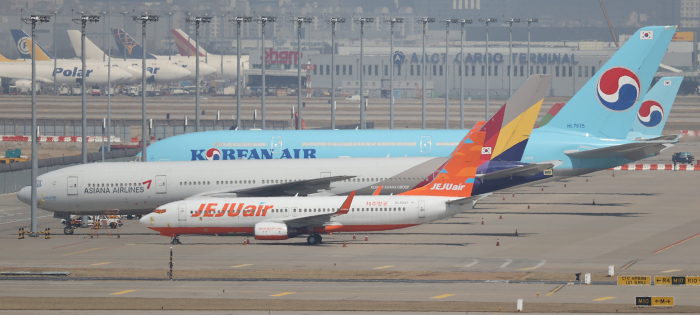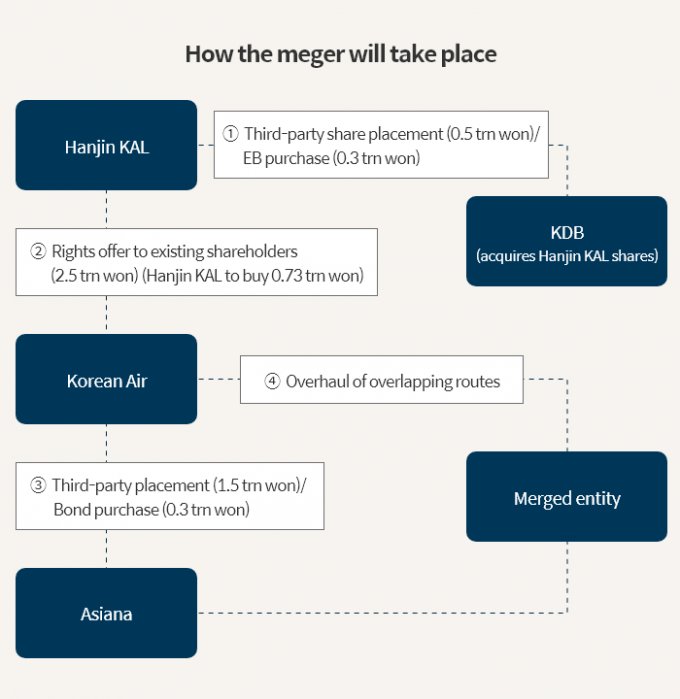Korean Air won't sell Asiana's budget carriers post-merger
The two airlines' three low-cost carriers will be combined
By Jul 19, 2021 (Gmt+09:00)
LG Chem to sell water filter business to Glenwood PE for $692 million


Kyobo Life poised to buy Japan’s SBI Group-owned savings bank


KT&G eyes overseas M&A after rejecting activist fund's offer


StockX in merger talks with Naver’s online reseller Kream


Mirae Asset to be named Korea Post’s core real estate fund operator



In November of last year, Korean Air agreed to take over the beleaguered airline, a deal set to create the world's seventh-largest airline. The acquisition is pending approval by the antitrust Korea Fair Trade Commission, which plans to complete its review by year's end.
According to its post-merger integration plan, Korean Air will combine both Air Busan Co. and Air Seoul Co. of Asiana with its budget carrier Jin Air Co., given the business competitiveness of the two LCCs, considered Asiana's prime assets.
The merged LCC will be under the control of either Korean Air, or its parent company Hanjin KAL Corp.
The post-merger integration plan was submitted to the state-run Korea Development Bank, the main creditor of both airlines, at the end of last month, investment banking and airline industry sources said on July 19.
Korean Air will retain its brand name after absorbing the local rival, which will then become its subsidiary. The Asiana brand will disappear.

FLIGHT ROUTES
To ease market concerns about its increased presence in the 13 popular flight routes for Korean air travelers, Korean Air plans to curb fare hikes. The routes include those from Seoul to New York, Los Angeles, Barcelona and Sydney. Together Korean Air and Asiana command over 70% of those routes.
On loss-making routes, including one between Seoul and Ulaanbaatar, the capital of Mongolia, Korean Air will continue to fly because of rules requiring airlines to maintain a certain number of flight routes.
Their merger is expected to create synergy worth 1.7 trillion won, far more than the previously estimated 600 billion won by streamlining their overlapping routes and setting up new transfer routes.
Korean Air estimates 500 billion won for IT system-related spending and another 100 billion won for brand and uniform integration in the merged entity's first few years.
Their combination will render about 1,200 employees redundant, but Korean Air stressed that the redundancy could be resolved through natural attrition, without layoffs.
Asiana flight-earned reward mileage remaining after the merger will be equally swapped to Korean Air miles. But the miles earned by credit card rewards programs will be exchanged into Korean Air miles at a discount.
Write to Chae-yeon Kim at why29@hankyung.com
Yeonhee Kim edited this article.
-
 Post-mergerKorean Air eyes $350 mn in cost savings from Asiana merger
Post-mergerKorean Air eyes $350 mn in cost savings from Asiana mergerApr 01, 2021 (Gmt+09:00)
2 Min read -
 Rights offeringKorean Air kicks off biggest-ever rights offer to finance Asiana takeover
Rights offeringKorean Air kicks off biggest-ever rights offer to finance Asiana takeoverFeb 22, 2021 (Gmt+09:00)
3 Min read -
 AirlinesKorean Air to buy rival Asiana in $1.6 bn deal to emerge as world’s 7th airline
AirlinesKorean Air to buy rival Asiana in $1.6 bn deal to emerge as world’s 7th airlineNov 16, 2020 (Gmt+09:00)
5 Min read


